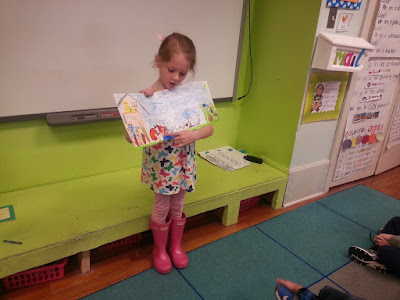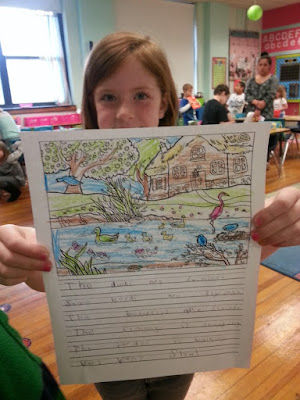Most of our readings for the week were informational texts [your child should be able to identify when a book they are reading is informational text, non-fiction, and fiction (and perhaps even realistic fiction) by the way]. But we also enjoyed the fast-becoming classic, "Click Clack Moo." The students wrote in their journals on topics inspired by both our readings and our experiences this week. Some wrote about their experience milking a cow (which we didn't do this week) while others wrote about whether or not they'd want to milk a cow.
 |
| I would not like to milk a cow because it will be nasty. (Landen) |
 |
| I want to milk a cow. I want to use gloves. (Patrick) |
 |
| I have milked a goat. I was waiting so nice that's how I got to go first. I milked the goat with my hands. (Johannah) |
Here, Patrick chose to write about the story we read earlier, Boom Chicka Rock, about mice that hide in the kitchen clock (behind the numbers like cuckoo birds).
 |
| If I was a mouse, I will go in the clock and I will find my correct number. |
Speaking of clocks - we read that book because we have been learning about clocks and how to tell time to the hour and half hour on analogue clocks for the last three weeks.
Now back to the fun farm stuff. Here's a quick wrap-up of what we saw, felt, and did.
Each day, we read a riddle about the farm animals that required the kids to use their sense of rhyme to solve it.
They made their own red barns full of farm animals so they could do the riddle at home too.
We sang "Old MacDonald everyday but substituted a student's name,
"Old MacJacob had a farm..."
Then that student got to choose the farm animal. We used Old MacDonald's name to do a fun word building activity. The students used the letters to make words they knew.
They were REALLY good at this. And they loved challenging themselves in this way.
For a fun kinesthetic activity, they pretended to be farmers, taking the chicken feed to their coupes. They had to use a wheelbarrow to do this. The chicken feed was a bean bag. Their wheelbarrow? A classmate!
Talk about problem-solving in action!
The next day, Nikki came back with some baby chicks.
Later that same day, Ava's parents brought in Pork Chop and Bacon - two 'baby' pigs that already weighed close to 60 lbs! The students got to feed them apples.
 |
| The farming Castleman family |
I did the same thing for the baby goat experience. So the next day, during their reading group time, I had the students think of questions they wanted to ask Ava's parents about pigs. They wrote their own questions and submitted them to the question bowl.
If I pulled their question out of the bowl, they got to ask it. By the end of the week, the students had a good idea about what words we use to begin our questions and were also able to compare the answers from the questions that we asked about each animal; Where do they sleep? How much do they cost? What do they eat? What animals do they get along with? Are there any animals it doesn't get along with? How much do they weigh?
Our final experience of the week wasn't with a farm animal, but with one of its products. The students made their own butter! Each group had a small container with some heavy whipping cream in it. They took turns shaking it up when the music played. They noticed it go from a liquid to a solid and then were very confused when they heard the sound of liquid swishing around again. I explained how the fat stayed together and the water separated from it. Then the students spread it on some bread and had a nice little snack!
In other learning news....we are working on the bossy r sounds. Er, ir, ur, ar, and or. Here's the gist of bossy r in this impeccably acted-out skit starring Johannah as Bossy R. Letters "h", "a", and "m" were getting along just fine
until.....(it's short - you gotta watch her shine)
We all get to act out er, ir, ur. The story goes - "e", "i", and "u" are trying to drive while r is beside them, bossing them around. So they are always having to hit the brakes to avoid collisions.
For the "or" sound, we just clap our flippers and bark like a seal.
Here's how we are working on our core content goals in some of our reading centers, sight word stations, and math workshops.
 |
 |
 |
| barn quilts to work on the new sight words |
 |
| The free-write option at the writing center |
I'll leave you with some great pics from recess and some of what we did last week (learning more about spring and forest animals).











































































